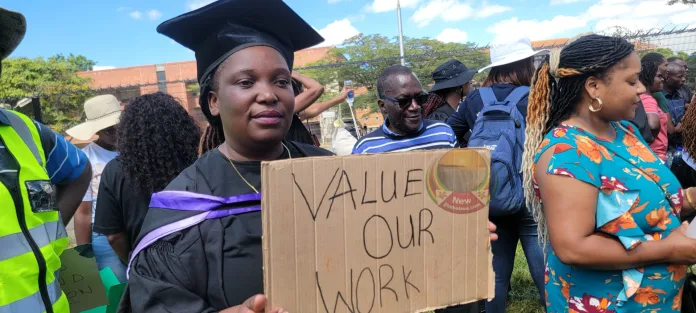By Fanuel Chinowaita

Harare, Zimbabwe – July 10, 2025 — The Zimbabwe National Students Union (ZINASU) has condemned what it calls a “deliberate and systematic effort to criminalize dissent” following the suspension and expulsion of student activists at several public universities, amid an ongoing lecturers’ strike at the University of Zimbabwe (UZ).
In a statement released yesterday, ZINASU said the wave of disciplinary actions violates both the Zimbabwean Constitution and international human rights obligations. The crackdown appears to be in response to student solidarity protests supporting striking lecturers, who have been demanding a living wage since April.
At the University of Zimbabwe, six students, Narshon Kohlo, Blessing Mtisi, Nodeshar Maingehama, Tafadzwa Katsande, Tawananyasha Hove, and Mtukura Tariro were indefinitely suspended.
The university cited breaches of its 1984 Rules of Student Conduct (Ordinance 30), accusing the students of inciting demonstrations on campus. These protests were in support of lecturers who are reportedly earning as little as US$250 per month and are demanding a tenfold increase to US$2,250, citing rising inflation and cost of living.
The disciplinary clampdown is not limited to UZ. At Midlands State University (MSU), five students faced disciplinary measures for allegedly recruiting peers into ZINASU without administrative consent.
One of them, Takunda Mhuka, was expelled, a move that has triggered widespread criticism. International watchdog group Scholars at Risk described the expulsion as a blatant attack on students’ right to freedom of association.
At Great Zimbabwe University (GZU), Linos Munogweyi was suspended for two semesters after posting what authorities deemed “derogatory” WhatsApp messages critical of university management. ZINASU has accused the university of policing private communication to silence dissent.
“This is a coordinated attempt to silence the voices of students who dare to speak out,” said ZINASU President Emmanuel Sitima. “These actions violate Sections 58, 59, and 61 of the Constitution which guarantee freedom of assembly, peaceful protest, and expression.”
The union has called for the immediate reinstatement of all suspended and expelled students, the launch of an independent inquiry into alleged abuse of university disciplinary procedures, and firm government assurances to uphold academic and democratic freedoms.
Meanwhile, the lecturers’ strike at UZ continues with no resolution in sight. The government’s latest offer of US$230, which falls below the current earnings of some junior staff, was rejected outright. Presidential spokesperson George Charamba admitted the offer was inadequate but offered no timeline for further negotiations.
In the interim, universities have started hiring what some students mockingly referred to as “virgins in the academic setting” inexperienced tutors allegedly brought in to fill the void left by striking faculty.
Observers say the crackdown on students is part of a broader effort by state-aligned institutions to stifle political expression among the youth.
Former ZINASU president Pride Mkono, who is now living in exile under the Students at Risk (StAR) program in Norway, warned that universities are “increasingly becoming tools of repression,” adding that expelled students are often blacklisted from enrolling elsewhere.
ZINASU said it would rally civil society, regional student movements, and international human rights organizations to apply pressure on Zimbabwean authorities. “Universities must remain bastions of freedom, not instruments of tyranny,” Sitima said.
As tension builds within higher education institutions, the fate of hundreds of students and lecturers hangs in the balance. With no end in sight to the strike or the suspensions, calls for justice and reform are growing louder both at home and abroad.
